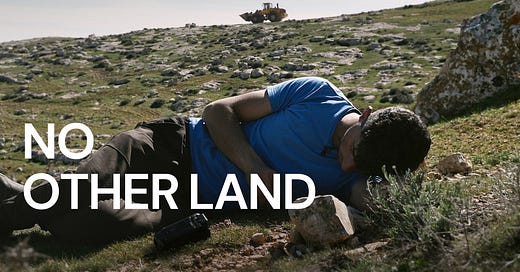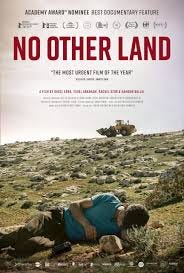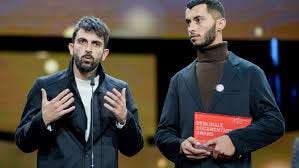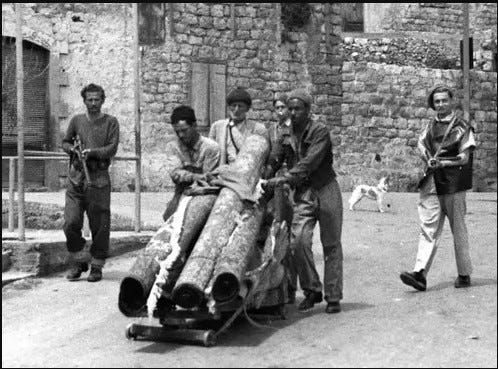No Other Land is a 2024 documentary co-directed by Palestinian and Israeli activists, including Basel Adra and Yuval Abraham. The film offers a haunting portrayal of the struggles faced by Palestinian communities in Masafer Yatta, covering the period from 2019 to October 2023. These communities are subjected to displacement due to Israeli military actions, with their homes destroyed and families forcibly moved to make way for military exercises. Through its intimate storytelling, the documentary brings the injustices faced by Palestinians to a global audience, emphasizing the urgency and humanity of their plight.
The documentary had its world premiere at the 74th Berlin International Film Festival in February 2024, where it was selected for the prestigious Panorama section. The film went on to win the Panorama Audience Award for Best Documentary Film and the Berlinale Documentary Film Award. In addition to its critical acclaim, No Other Land has a Norwegian connection, further cementing its international resonance.
Pushback
The film delves deeply into the Israeli-Palestinian conflict, sparking controversy in some circles. Israeli Culture Minister Miki Zohar described the film’s Oscar nomination as “a sad moment for the world of cinema,” accusing it of being anti-Israeli propaganda and urging cultural institutions to refrain from screening it. On the other side of the spectrum, some within the Palestinian Boycott, Divestment, and Sanctions (BDS) movement have also criticized the film for its collaboration with Israeli filmmakers, even though they oppose the occupation.
After the documentary No Other Land was screened at O Cinema in Miami Beach, Mayor Steven Meiner moved to evict the theater from its city-owned property, calling the documentary "one-sided propaganda" and an "attack on Jewish people." He also proposed halting future financial grants to the cinema. In response, civil rights groups voiced concerns, arguing that the mayor’s actions infringed on freedom of speech. Despite political pressure, O Cinema stood firm, continuing to show No Other Land in defiance. A vote on the matter is expected soon, but the controversy has sparked broader debates about the limits of free expression and the importance of diverse perspectives in the arts. Interestingly, the accusation that the documentary is an "attack on Jewish people" remains unexplained, as it primarily shows the effects of Israeli policies on Palestinian civilians.
Despite these controversies, No Other Land garnered significant attention, including an Academy Award nomination for Best Documentary Feature at the 97th Oscars. The Oscar jury praised the film for its courage in documenting state-backed violence and its ability to convey the human cost of occupation with both intimacy and urgency.
Displacement and Destruction
One of the most striking revelations in the documentary is the Israeli military’s use of a large section of Masafer Yatta for military training and firing zones. Official documents reveal that the true aim of declaring this land a military zone was not solely for training purposes but to prevent Palestinian villages from expanding.
We witness the military’s systematic destruction of homes, cutting of water lines, and filling of wells, all in an effort to displace the people who have lived in these areas for generations. As the film’s co-director, Basel Adra, a lifelong member of the community, narrates his personal connection to the land, the film highlights the relentless violence and discrimination Palestinians face as they fight to remain in their ancestral homes.
Bulldozing a School
Throughout the 95-minute film, the audience is introduced to Adra’s upbringing, deeply rooted in activism. His father, Nasser, a long-time advocate for Palestinian rights, serves as a powerful symbol of the enduring history of resistance against repression. Adra’s commitment to speaking out against injustice is fueled by his father’s example. His weapon is the camera, and the truth of their experiences is his message.
One of the most emotionally charged moments in the film occurs when the Israeli military bulldozes a school in Masafer Yatta. The destruction of a vital community space, particularly a place of learning for children, deeply resonated with all of us. This attack on what should be a sacred place shows how far the Israeli military will go to erase Palestinian existence in the region.
The film also exposes the unchecked violence of Israeli settlers, who attack Palestinians with gleeful smiles, while soldiers either directly assist or stand idly by, enabling the brutality.
Friendship and Solidarity Amidst Conflict
Yet, No Other Land also offers a glimmer of hope amidst the darkness. The unlikely friendship between Basel Adra and Yuval Abraham—an Israeli investigative journalist and activist—serves as a testament to the power of cross-cultural solidarity. Together, they share a vision of justice, equality, and freedom for Palestinians. Their collaboration emphasizes the potential for understanding and cooperation, even in the most politically charged of environments.
However, their friendship also highlights the stark differences in how they experience the world. While Basel, a Palestinian, faces systemic discrimination and violence daily, Yuval, an Israeli, enjoys privileges that Basel can only dream of. These disparities are exemplified in the film by the segregation of roads in the West Bank, where Israeli cars with yellow license plates are free to travel, while Palestinian cars with green plates are restricted.
However, Yuval’s solidarity comes at a price. In one chilling scene, a settler films him and openly threatens him, calling him a Jew who has sided with the enemy. The settler warns that Yuval’s picture will be shared on social media and that someone will come for him soon. This moment exposes another brutal reality—the extremist Israelis don’t only target Palestinians but also Israelis who dare to stand against apartheid. The cost of speaking out is high, even for Jewish Israelis, as peace activists face threats, harassment, and sometimes even violence from their own society.
The Killing of Basel’s Cousin
In one particularly harrowing moment, the film captures the unprovoked killing of Basel’s cousin by a heavily armed Israeli settler. This senseless act of violence underscores the pervasive danger that Palestinians face on a daily basis, even when they are simply going about their lives. The tragic loss of Basel’s cousin serves as a painful reminder of the human cost of the occupation.
Amidst the ongoing struggle, No Other Land remains a powerful testament to resilience, shedding light on the suffering of Palestinians in the face of state-backed violence and illegal occupation. The film not only portrays their hardships but also highlights their unwavering spirit and determination to fight for their land, rebuild their homes, and their future.
Ultimately, No Other Land is not just a film. It is a call to action, a rallying cry for justice, and a stark reminder of the ongoing violence and human suffering that continues to shape the Israeli-Palestinian conflict. The documentary’s powerful imagery and emotional resonance make it a vital contribution to global discussions about human rights, peace, and the pursuit of justice.
As the film concludes in late October 2023, shortly after the October 7th Hamas attack on Israel and Israel’s subsequent bombing of Gaza, the violence depicted in the documentary takes on an even more powerful context. While the devastation in Gaza dominated global headlines, the ongoing violence in the West Bank, often overlooked, continued unabated and, in some instances, escalated. The systematic displacement of Palestinian communities, the destruction of homes, and the increasing attacks by settlers all contribute to the deepening crisis. The indiscriminate bombing of Gaza, coupled with the violence in the West Bank, paints a stark picture of the conflict, underscoring the urgency for a peaceful resolution.
All articles on Diaspora Dialogue are free to read for one year from publication. If you’ve
All articles on Diaspora Dialogue are free to read for one year from publication. If you’ve enjoyed this piece and would like to support my work, you can do so by subscribing, or by buying me a coffee. Thank you for reading and being part of the dialogue!










Was just able to see this wonderful film. One theatre in the city is showing it only three nights this weekend, but was the fullest I’ve seen this theatre in recent years. Truly a powerful, moving and inspiring film. I wish everyone could experience it.